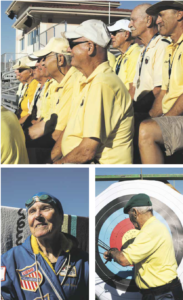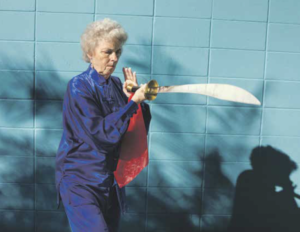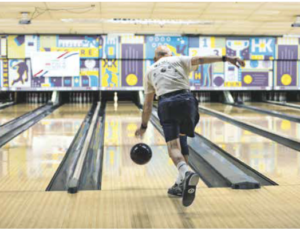Monocle’s Winter Weekly, 2017/2018
Each sunny winter, athletes as old as 96 flock to compete in the Florida Senior Games. Featuring everything from archery to volleyball, the games attract competitors keen to challenge age bias in sport – or “just survive” the exercise.
Zen reigns in the sun-dappled car park of the Ross Norton Recreation Center. Outside the sports complex in Clearwater – a town of 115,000 halfway down the Gulf side of the Floridian peninsula – 72-year-old Carleen Bridgeman is standing beside her bright-yellow Beetle. In the early morning light, she’s trying to follow an instructional video on her phone, moving her hands in front of her and shifting weight from one foot to another. Does she think she might win a tai chi medal later today? “No. I’m just trying to survive,” she replies with a wry grin. Welcome to Florida’s annual wintertime Senior Games: a vitamin D-infused mini-Olympics for America’s bright old things. Bridgeman says she was “too chicken” to compete last year when tai chi premiered at the Games. Will she have the guts to follow through today?
The Florida event is part of a network of state games for over-50s that prefaces a biennial national shindig and, according to Michael Washington, it has a number of advantages over its rivals. The director of events for the Florida Sports Foundation – the organisation behind the Games – says that besides Florida being the last chance to qualify for the nationals, the lure of America’s sun belt and its promise of balmy weather proves a major draw to inhabitants from northern states that are starting to freeze over for winter. “They love it here,” he says of the competitors, many of them out-of-staters, part-time residents or retirees who have moved south. “It’s like a vacation.”
Tai chi is overseen by the ponytailed Bob Messinger – who refers to himself as a “shifu”, or teacher – a guru with three decades of experience, who first discovered the martial art after seeing the “single whip” movement on TV. “This is not about fighting or winning. It’s about competing,” he tells the assembled throng of retirees ahead of the “push-hands” sparring. Listening in is 74-year-old grandmother Janet Montague. She’s not to be crossed, especially when wielding a sabre as part of her advanced category singles – more performance than battle. Montague took home three gold medals last year – perhaps due to the lucky stripy socks she points to – and she’s won top honours this year, too.
Tai chi is the opening sport of the nine-day competition, but Florida’s Senior Games aren’t just about Eastern inner peace (and strengthening your balance). The event, which sees more than 2,000 seniors compete, has plenty of gruelling disciplines to get the heart racing, including powerlifting and track and field. The games aren’t short of age bracket-defying athletes giving younger generations a run for their money, either.
Poolside at Clearwater’s Long Center, lithe and tanned 85-year-old Charlie Weatherbee is a prime example of the spirit of the competitors. Back in the water just two months after a heart attack (the ex-paramedic promptly popped an aspirin and drove himself to the hospital when it happened), he balances playing in the Gulf Coast Banjo Society, restoring instruments and, of course, swimming. “I don’t wear my teeth when I swim,” he says, shortly after taking part in the 100-yard breaststroke. “You can’t – because when you breathe heavy you lose them!”
Unlike at more conventional sporting occasions, the athletes at the Senior Games are divided into age categories with five-year intervals, given it would hardly be fair to pit a 50-year-old against someone four decades older. And while sometimes that can work to a competitor’s advantage – a 90-year-old may find themselves alone in their category and get placed with younger members for a race, guaranteeing them a gold in their age bracket no matter the outcome – there’s little doubt of the pedigree of performers. Weatherbee, whose heart and artificial knee may be testament to inevitable degeneration, shows little sign of going quietly into the night, focused on adding to his medal stash. “He may be old but he’s fast,” says 79-year-old Pat Bond cheekily as she passes, clutching a recently won silver medal in her hand. And she’s right. He ended up smashing a record for the 200-yard individual medley, held since 2005, by more than a minute and a half.
Over at the outdoor Joe DiMaggio Sports Complex, seniors are lined up in a row staring intensely at the targets ahead. Archery is one of the most popular sports and family and friends are camped out on the grass in picnic chairs to show their support. Given their ages, many competitors use compound bows that reduce toll on the limbs; others, like John Horwath, also have a release aid for firing the arrows since his fingers “gave up on him”. Horwath, the Games’ 2016 athlete of the year, can be forgiven that acquiescence. Forgiven, too, is the fact that he now sits down to shoot. Because Horwath – who first discovered archery shooting deer more than six decades ago, long before ranges were commonplace – is 95, the holder of three state and national records and by far the oldest person shooting out in the warm winter sunshine.
Horwath has spent 26 years in The Villages, a huge, purpose-built retirement community just under two hours’ drive away in central Florida. Eighty-six swimming pools and live music at its bars every night are just some of the multifarious amenities available to its 120,000 residents, who believe they may just have discovered seventh heaven. “It’s awesome,” says fellow Villager Doris Schaffer, shooting a little further down from Horwath. “It’s like Disneyland for us.” Once again The Villages has a hefty presence at the games, from swimming to archery. Seventeen residents are out on the range – dressed in matching yellow tops – as part of the community’s 300 member-strong archery club.
Watching over proceedings is José Rodríguez. He was involved with the first National Senior Games in the 1980s and the Florida Senior Games in the 1990s, and is now setting up a debut International Senior Games of the Americas to launch in Cancún next year. Although he says the Florida Games started as an exercise in “wellbeing and fitness for the ‘snowbirds’ making the state their winter home”, he also believes the competition and numbers are getting greater each year and opening up to a wider gamut of people.
More than anything, attending Florida’s Senior Games brings up countless memorable stories. There’s the nonagenarian bowling duo Jack Appel and Stanley Corwin, who both wear Second World War veteran caps to bowl as a testament to their respective times in Normandy and the South Pacific. Or swimmer Jean Troy, who may be heavily hard of hearing – she wasn’t sure if she’d won or not given the din at the pool – but set records in the 100-yard breaststroke and 200-yard freestyle. Or lean 96-year-old French- Canadian shuffleboard hero Paul Allaire, a true snowbird who relocates from New York State to Florida for six months when it starts to get cold and does sport to say sharp.
“Everyone has a champion deep inside that wants to come out,” says Rodríguez as he watches the competitors prepare to shoot their arrows. “The Senior Games movement has revived the champion within each of these competitors.” It sure beats Scrabble, anyway.


